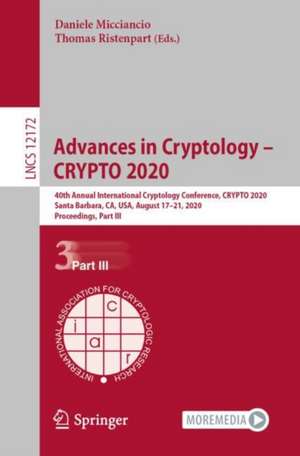Advances in Cryptology – CRYPTO 2020: 40th Annual International Cryptology Conference, CRYPTO 2020, Santa Barbara, CA, USA, August 17–21, 2020, Proceedings, Part III: Lecture Notes in Computer Science, cartea 12172
Editat de Daniele Micciancio, Thomas Ristenparten Limba Engleză Paperback – 12 aug 2020
The 85 papers presented in the proceedings were carefully reviewed and selected from a total of 371 submissions. They were organized in topical sections as follows:
Part I: Security Models; Symmetric and Real World Cryptography; Hardware Security and Leakage Resilience; Outsourced encryption; Constructions.
Part II: Public Key Cryptanalysis; Lattice Algorithms and Cryptanalysis; Lattice-based and Post Quantum Cryptography; Multi-Party Computation.
Part III: Multi-Party Computation; Secret Sharing; Cryptanalysis; Delay functions; Zero Knowledge.
| Toate formatele și edițiile | Preț | Express |
|---|---|---|
| Paperback (3) | 667.38 lei 6-8 săpt. | |
| Springer International Publishing – 12 aug 2020 | 667.38 lei 6-8 săpt. | |
| Springer International Publishing – 12 aug 2020 | 669.66 lei 6-8 săpt. | |
| Springer International Publishing – 13 aug 2020 | 724.95 lei 6-8 săpt. |
Din seria Lecture Notes in Computer Science
- 20%
 Preț: 1061.55 lei
Preț: 1061.55 lei - 20%
 Preț: 307.71 lei
Preț: 307.71 lei - 20%
 Preț: 438.69 lei
Preț: 438.69 lei - 20%
 Preț: 645.28 lei
Preț: 645.28 lei -
 Preț: 410.88 lei
Preț: 410.88 lei - 15%
 Preț: 580.46 lei
Preț: 580.46 lei - 17%
 Preț: 427.22 lei
Preț: 427.22 lei - 20%
 Preț: 596.46 lei
Preț: 596.46 lei -
 Preț: 381.21 lei
Preț: 381.21 lei - 20%
 Preț: 353.50 lei
Preț: 353.50 lei - 20%
 Preț: 1414.79 lei
Preț: 1414.79 lei - 20%
 Preț: 309.90 lei
Preț: 309.90 lei - 20%
 Preț: 583.40 lei
Preț: 583.40 lei - 20%
 Preț: 1075.26 lei
Preț: 1075.26 lei - 20%
 Preț: 310.26 lei
Preț: 310.26 lei - 20%
 Preț: 655.02 lei
Preț: 655.02 lei - 20%
 Preț: 580.93 lei
Preț: 580.93 lei - 20%
 Preț: 340.32 lei
Preț: 340.32 lei - 15%
 Preț: 438.59 lei
Preț: 438.59 lei - 20%
 Preț: 591.51 lei
Preț: 591.51 lei - 20%
 Preț: 649.49 lei
Preț: 649.49 lei - 20%
 Preț: 337.00 lei
Preț: 337.00 lei -
 Preț: 449.57 lei
Preț: 449.57 lei - 20%
 Preț: 607.39 lei
Preț: 607.39 lei - 20%
 Preț: 1024.44 lei
Preț: 1024.44 lei - 20%
 Preț: 579.30 lei
Preț: 579.30 lei - 20%
 Preț: 763.23 lei
Preț: 763.23 lei - 20%
 Preț: 453.32 lei
Preț: 453.32 lei - 20%
 Preț: 575.48 lei
Preț: 575.48 lei - 20%
 Preț: 585.88 lei
Preț: 585.88 lei - 20%
 Preț: 825.93 lei
Preț: 825.93 lei - 20%
 Preț: 763.23 lei
Preț: 763.23 lei - 17%
 Preț: 360.19 lei
Preț: 360.19 lei - 20%
 Preț: 1183.14 lei
Preț: 1183.14 lei - 20%
 Preț: 340.32 lei
Preț: 340.32 lei - 20%
 Preț: 504.57 lei
Preț: 504.57 lei - 20%
 Preț: 369.12 lei
Preț: 369.12 lei - 20%
 Preț: 583.40 lei
Preț: 583.40 lei - 20%
 Preț: 343.62 lei
Preț: 343.62 lei - 20%
 Preț: 350.21 lei
Preț: 350.21 lei - 20%
 Preț: 764.89 lei
Preț: 764.89 lei - 20%
 Preț: 583.40 lei
Preț: 583.40 lei -
 Preț: 389.48 lei
Preț: 389.48 lei - 20%
 Preț: 341.95 lei
Preț: 341.95 lei - 20%
 Preț: 238.01 lei
Preț: 238.01 lei - 20%
 Preț: 538.29 lei
Preț: 538.29 lei
Preț: 667.38 lei
Preț vechi: 785.16 lei
-15% Nou
Puncte Express: 1001
Preț estimativ în valută:
127.71€ • 131.95$ • 106.24£
127.71€ • 131.95$ • 106.24£
Carte tipărită la comandă
Livrare economică 20 martie-03 aprilie
Preluare comenzi: 021 569.72.76
Specificații
ISBN-13: 9783030568764
ISBN-10: 3030568768
Pagini: 832
Ilustrații: XV, 832 p. 448 illus., 31 illus. in color.
Dimensiuni: 155 x 235 mm
Greutate: 1.17 kg
Ediția:1st ed. 2020
Editura: Springer International Publishing
Colecția Springer
Seriile Lecture Notes in Computer Science, Security and Cryptology
Locul publicării:Cham, Switzerland
ISBN-10: 3030568768
Pagini: 832
Ilustrații: XV, 832 p. 448 illus., 31 illus. in color.
Dimensiuni: 155 x 235 mm
Greutate: 1.17 kg
Ediția:1st ed. 2020
Editura: Springer International Publishing
Colecția Springer
Seriile Lecture Notes in Computer Science, Security and Cryptology
Locul publicării:Cham, Switzerland
Cuprins
Multi-Party Computation: Two-Sided Malicious Security for Private Intersection-Sum with Cardinality.- Private Set Intersection in the Internet Setting From Lightweight Oblivious PRF.- Multiparty Generation of an RSA Modulus.- Secret Sharing.- Non-Malleability against Polynomial Tampering.- Non-Malleable Secret Sharing against Bounded Joint-Tampering Attacks in the Plain Model.- Nearly Optimal Robust Secret Sharing against Rushing Adversaries.- Cryptanalysis.- Cryptanalytic Extraction of Neural Network Models.- Automatic Verification of Differential Characteristics: Application to Reduced Gimli.- The MALICIOUS Framework: Embedding Backdoors into Tweakable Block Ciphers.- Cryptanalysis of The Lifted Unbalanced Oil Vinegar Signature Scheme.- Out of Oddity -- New Cryptanalytic Techniques against Symmetric Primitives Optimized for Integrity Proof Systems.- Improved Differential-Linear Attacks with Applications to ARX Ciphers.- Cryptanalysis Results on Spook: BringingFull-round Shadow-512 to the Light.- Cryptanalysis of LEDAcrypt.- Alzette: a 64-bit ARX-box (feat. CRAX and TRAX).- Delay functions.- Order-Fairness for Byzantine Consensus.- Generically Speeding-Up Repeated Squaring is Equivalent to Factoring: Sharp Thresholds for All Generic-Ring Delay Functions.- Zero Knowledge.- Compressed Sigma-Protocol Theory and Practical Application to Plug & Play Secure Algorithmics.- A Tight Parallel Repetition Theorem for Partially Simulatable Interactive Arguments via Smooth KL-Divergence.- Interactive Proofs for Social Graphs.- The Measure-and-Reprogram Technique 2.0: Multi-Round Fiat-Shamir and More.- Fiat-Shamir for Repeated Squaring with Applications to PPAD-Hardness and VDFs.- PPAD-Hardness and Delegation with Unambiguous Proofs.- New Techniques for Zero-Knowledge: Leveraging Inefficient Provers to Reduce Assumptions, Interaction, and Trust.- Spartan: Efficient and general-purpose zkSNARKs.- NIZK from LPN and Trapdoor Hash via Correlation Intractability for Approximable Relations.- Shorter Non-Interactive Zero-Knowledge Arguments and ZAPs for Algebraic Languages.- Non-Interactive Zero-Knowledge Arguments for QMA, with preprocessing.
